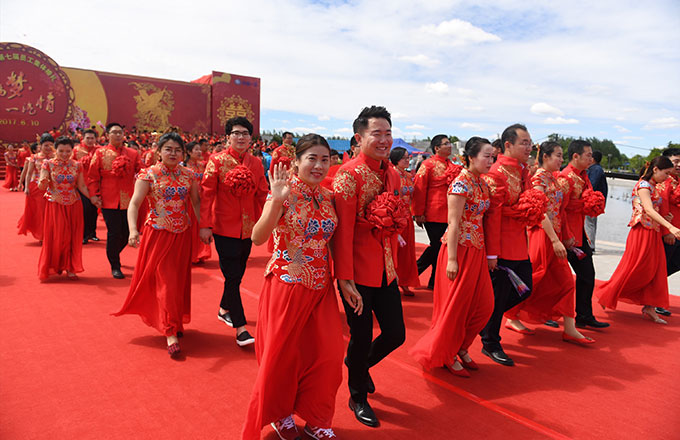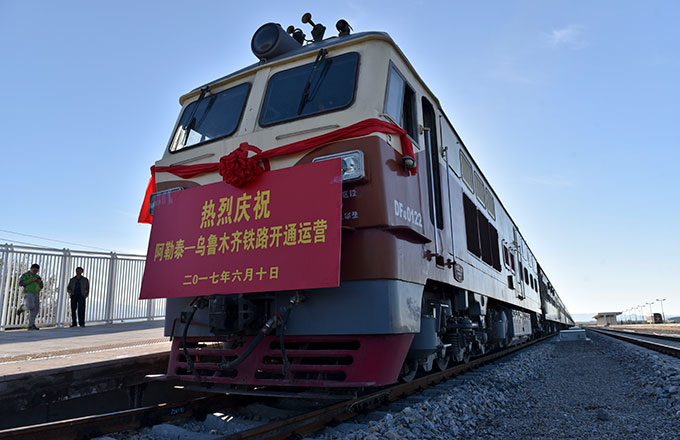Mao Zedong thought must be correctly understood as an integral whole
July 21, 1977
Marxism-Leninism and Mao Zedong Thought constitute the guiding ideology of our Party. Mao Zedong Thought has sprung from and developed Marxism-Leninism. But Lin Biao negated Mao Zedong Thought by saying that it was fully embodied in the "three constantly read articles". He even severed Mao Zedong Thought from Marxism-Leninism. This was a gross distortion of Mao Zedong Thought and was most detrimental to the cause of the Party and socialism in China and to the cause of the international communist movement.
In my letter of April 10 to Comrades Hua Guofeng and Ye Jianying and the Central Committee of the Party, I said that we should use genuine Mao Zedong Thought taken as an integral whole to guide our Party, our army and our people in order to advance the cause of the Party and socialism in China and the cause of the international communist movement. In saying that we should use as our guide genuine Mao Zedong Thought taken as an integral whole, I mean that we should have a correct and comprehensive understanding of Mao Zedong Thought as a system and that we should be proficient at studying it, mastering it, and applying it as a guide to our work. Only in this way can we be sure that we are not fragmenting Mao Zedong Thought, distorting or debasing it. We can then see that what Comrade Mao Zedong said with regard to a specific question at a given time and under particular circumstances was correct, and that what he said with regard to the same question at a different time and under different circumstances was also correct, despite occasional differences in the extent of elaboration, in emphasis and even in the formulation of his ideas. So we must acquire a correct understanding of Mao Zedong Thought as an integral system instead of just citing a few specific words or sentences. But the Gang of Four, and especially their so-called theoretician Zhang Chunqiao, distorted and adulterated Mao Zedong Thought. They tried to fool people or intimidate them by quoting a phrase or two from Comrade Mao Zedong. We need to have a true grasp of Mao Zedong Thought and a correct understanding of it as an integral whole, even when dealing with a particular sphere or one aspect of a particular problem. Take, for example, the question of the intellectuals, which pertains to a specific sphere. Comrade Mao Zedong always attached importance to the role of the intellectuals, at the same time stressing that they should earnestly remould their world outlook. He did this both for the good of the intellectuals themselves and for the purpose of better mobilizing their energies, releasing their talents and enabling them to serve the socialist cause better. But the Gang of Four indiscriminately labelled all intellectuals the "stinking Number Nine" and asserted that it was Chairman Mao who so named them. We should admit that at one time Comrade Mao Zedong treated the intellectuals as part of the bourgeoisie, but we should no longer do so. Comrade Mao Zedong did value the role of the intellectuals in the whole process of revolution and construction. To counter the slander spread by the Gang of Four, he declared in 1975, "We can't do without Number Nine." We need a correct and systematic understanding of Comrade Mao Zedong's thinking and policy regarding intellectuals. Or take another example, the question of the relationship between the leaders and the masses. It is a consistent principle of Mao Zedong Thought that the people are the force that propels history forward. Being a great Marxist, Comrade Mao Zedong repeatedly spoke out against inappropriate and unscientific assessments of himself, and on many occasions he taught us what the correct relationship should be between the people and leaders. Mao Zedong Thought has developed Marxism-Leninism in many spheres, not just in some individual aspects. It constitutes an integral system and is a further development of Marxism. For this reason I suggest that in addition to editing and publishing the works of Mao Zedong, comrades doing theoretical work should endeavour to expound Mao Zedong Thought as a system from various perspectives. We should educate our Party in Mao Zedong Thought as a system so that it can continue to guide us forward.
Today I should like to discuss briefly the theory of Party building, which is a component part of Mao Zedong Thought. Marx and Engels did not say much on this subject, but Lenin had a comprehensive theory concerning it. It was precisely because Lenin built such a fine party that the October Revolution triumphed and that the first socialist country was created. And it was Comrade Mao Zedong who developed Lenin's theory of Party building most comprehensively. Even in the period of revolutionary struggle in the Jinggang Mountains, that is, in the period of the formation of the Chinese Red Army, his ideas on Party building were already well defined. You can see this by reading the resolution adopted at the Ninth Party Congress of the Fourth Army of the Red Army. His comprehensive theory on the subject took shape, on the basis of practice, in the Yan'an rectification movement. He developed an integral theory on the type of party to be built and its guiding ideology and style of work. By creating a comprehensive theory of Party building in the Yan'an rectification movement -- and by educating the whole Party, army and people in this theory -- he made it possible for us to build a fine party; that was why we were able to win complete victory in the War of Resistance Against Japan [1937-45] and in the War of Liberation [1946-49]. After the founding of the People's Republic of China our Party continued to be vigorous and dynamic. Later, Comrade Mao Zedong's theory of Party building was developed further. In 1957 he summed up our aim as follows: "Our aim is to create a political situation in which we have both centralism and democracy, both discipline and freedom, both unity of will and personal ease of mind and liveliness, and thus to promote our socialist revolution and socialist construction, make it easier to overcome difficulties, build a modern industry and modern agriculture more rapidly and make our Party and state more secure and better able to weather storm and stress." Of course, Comrade Mao Zedong was discussing a political situation that should prevail not only in the Party but also in the army and among the people of the whole country. To repeat, this kind of political situation should prevail in the whole Party, in the whole army and among the whole people.
Let us recall that it is precisely according to Comrade Mao Zedong's theory of Party building that this fine party of ours has been built. After the rectification movement in Yan'an, people in both the front and rear areas were active and buoyant, their minds were at ease and they were united as one. The Party built by Comrade Mao Zedong was able to encourage a broad spirit of democracy and of voluntary observance of discipline among those working at the lower levels and, on this basis, it established a high level of centralism. Who then would not willingly obey the orders and answer the calls of Chairman Mao and the Central Committee? Without this style of work in the Party, how could we have defeated an enemy so much stronger than we, and how could we have gone on from victory to victory after the founding of the People's Republic?
The Gang of Four's opposition to Comrade Mao Zedong's theory of Party building had disastrous effects on the building of our Party and its style of work. I don't want to go into that in detail today. How can we create the political situation advocated by Comrade Mao Zedong? By earnestly studying his thinking on Party building. That thinking encompasses a great many fundamental principles. These include: combining a high degree of democracy with a high degree of centralism; distinguishing between the two different types of contradictions [those among the people and those between the people and the enemy] and handling each correctly; applying the formula ``unity -- criticism -- unity''; ``learning from past mistakes to avoid future ones and curing the illness to save the patient''; giving full scope to democracy in order to unite more than 95 per cent of the cadres and the masses; following the mass line and trusting the masses; and acting on the four-character slogan Comrade Mao Zedong wrote for the Central Party School in Yan'an, ``Seek truth from facts.'' It seems to me that the call for the ``three honests'' -- the Daqing Oilfield workers' exhortation to be an honest person, honest in word and honest in deed -- is identical with seeking truth from facts. I think that the principles of following the mass line and seeking truth from facts are of fundamental importance in the style of work advocated by Comrade Mao Zedong. Of course, the relationships between democracy and centralism and between freedom and discipline are also very important. But in view of the existing state of affairs in our Party, I believe that following the mass line and seeking truth from facts take on special importance. Comrade Mao Zedong was a thoroughgoing materialist. He had complete faith in the masses and always opposed any act that was not in keeping with trust in the masses and reliance on them. He listened particularly to what the masses had to say. Our comrades certainly remember how the production campaign was launched in the Yan'an days. What were the reasons for that production campaign? One was that we had requisitioned too much grain from the masses, so that there were complaints among them, which made many Party members unhappy. But Comrade Mao Zedong saw things differently. He said that the complaints were justified and were the voice of the masses. He was indeed great and different from the rest of us in that he was able to discern the problems behind the complaints of the masses and formulate the principles and policies required to deal with them. He paid great attention to the opinions, ideas and problems of the masses.
Why do I say that seeking truth from facts is of such importance at present? Because our effort to improve the style of work of the army and among the people at large hinges on the improvement of the Party's style of work. The Gang of Four really debased our standards of social conduct. For 10 years or even longer, they engaged in disruptive activities, acting at the outset in collaboration with Lin Biao. Things reached such a pass that many of our Party comrades dared not speak out and, in particular, dared not tell the truth but resorted to pretence and deception. Even some of our veteran comrades became infected with this bad habit, which was unforgivable. But provided we have full faith in the masses, seek truth from facts, ensure democracy and reaffirm and further develop Comrade Mao Zedong's theory of Party building and the Party's style of work, we can certainly bring about the political situation he envisaged. With such a political situation, we shall be able to weather every storm and test. We must create a political situation in which the whole Party, army and people are united under the leadership of the Central Committee and in which we have ``both unity of will and personal ease of mind and liveliness'', a situation in which we can place all problems on the table for discussion and people can criticize the leading comrades when they think it necessary.
It is essential to consolidate the Party and rectify its style of work. Veteran comrades should be involved in this process along with the others. Of course, that doesn't mean that everyone will have to pass a severe test. That indiscriminate method won't be used any more. But it is still necessary that we voluntarily rectify incorrect styles of work. Let us set a good example for the young Party members and cadres, help and guide them and pass our experience on to them. Let us effectively help and guide them in applying the theory on Party building and on the Party's style of work created by Comrade Mao Zedong and tell them about our experience in this regard. If we are successful in this, we will be able to surmount any difficulty and endure any storm, and our socialist revolution and construction will be able to develop to the full.
At this time, the political consciousness of the whole Party, army and people has risen remarkably, as has their ability to distinguish right from wrong. People are using their heads, thinking problems over and showing concern for the state and the Party. When the Gang of Four was wrecking the Party, the overwhelming majority of the people -- one can say, 99 per cent of our cadres, Party members and people generally -- were deeply disturbed. We have such fine cadres, such fine Party members and such a fine people, with such a high level of political consciousness and such boundless confidence in the cause of the Party! It is they who represent the surest guarantee that we can overcome all difficulties and win great victories in all fields. It is they who are our country's most precious asset. Therefore, I am certain, as are all of you, that under the leadership of the Central Committee we shall unite the whole Party, the whole army and all the people of our various nationalities, and that, holding high the great banner of Mao Zedong Thought, we shall be able to utilize all positive factors to achieve the four modernizations by the end of this century. We shall enable our socialist state and the cause of our Party to grow and prosper, and we shall further consolidate our dictatorship of the proletariat. Thus we shall be able to make still greater contributions to the international communist movement and to all mankind.
(Excerpt from a speech at the Third Plenary Session of the Tenth Central Committee of the Communist Party of China.)
(From Selected Works of Deng Xiaoping, Volume II <1975-1982>)
- China issues guidelines to develop 'all-for-one' tourism demonstration zones
- Torrential rain triggers disaster in Southwest China
- Harvest time for wheat reapers in Shanxi
- Over 200 couples marry in Changchun group wedding
- Calligraphy tops other icons of Chinese culture, WeChat data shows



















